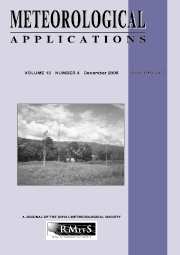Article contents
Precipitation assessment of a superensemble forecast over South-East Asia
Published online by Cambridge University Press: 01 July 2005
Abstract
A superensemble forecast that consists of six operational general circulation models is tested to simulate weather parameters over the equatorial South-East Asian region. The forecast technique, developed at Florida State University, is a unique ensemble that has proved to be one of the better prognosticators for weather forecasting. In this paper, the root mean square errors of the superensemble precipitation for a case of a severe tropical rainfall event during the winter monsoon of 2001 were smaller than the other global operational member or ensemble models used, indicating a skilled forecast. This trait is also reflected in the equitable threat score which indicates the association of the common rainfall threshold distribution between the forecast and observed best rainfall analysis from the Tropical Rainfall Measurement Mission (TRMM) and Special Sensor Microwave Imager (SSM/I) dataset, where although it is slightly underpredicted for light rain thresholds, its results are still superior to other individual member or even the ensemble mean forecasts. Higher correlation between the superensemble forecast and the observed is maintained for up to 3-day forecasts, which indicates its potential as a reliable and good forecast tool for predicting equatorial precipitation.
- Type
- Research Article
- Information
- Copyright
- © 2005 Royal Meteorological Society
- 5
- Cited by


